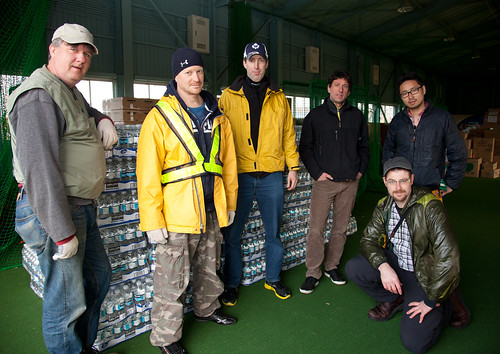
Currently, there are shortages of gasoline and rental trucks across Japan. As you could imagine, this creates one of the largest logistical challenges for anyone organizing deliveries up to Tohoku. For our first two trips, we were able to secure a special “Emergency Relief Vehicle” permit for our trucks from local police departments. That allowed us access to the still-closed Tohoku expressway, and emergency vehicles are allowed to cut into gasoline lines at local stations.

(Be considerate though – each station has a daily quota, and if a 10-truck caravan fills up after cutting in line, the locals who have been waiting patiently at the end of a three-hour line, will end up being turned away without being able to fill-up after the daily quota is maxed out.)
The next challenge is find food and supplies. Thanks to generous donors, collection centers across Tokyo have been filling up quickly. Currently, there are three major collection points. Second Harvest, Tokyo IS Support Center, and Peace Boat. Please see the list of places to send material aid donations for details.
A few people have asked why our collection center at IKON Pubs has put a pause on collecting donations. There are two reasons for this. The first one is that Foreign Volunteers Japan is now putting more effort into matching up delivery runs with local needs and requests from individual refugee centers across Tohoku. The second one is that Foreign Volunteers Japan is now focusing on securing large-scale bulk supplies for the affected areas.

We’ve found that randomly sending up shipments often causes more harm than it helps. The sheer devastation of the tsunami has destroyed a large percentage of the habitable buildings in several towns, so the refugee shelters have been established in schools, town halls, auditoriums, company buildings, community centers, etc…
This means that refugees themselves are now occupying buildings that may have once been able to provide storage facilities for each community. When we send up supplies that are not immediately needed by the community we deliver them to, they do not have the ability to store those items until a need arises. So many of the smaller aid groups have actually had to return to Tokyo or Nagoya with trucks only half-unloaded.
Supplies that have been rejected have included rice (no way to cook it), clothes (not seasonally appropriate, or not in the right sizes), random boxes of donations (too difficult to sort), other supplies that they had recently received in bulk, and even items that were received in small numbers (since it is important to distribute donations evenly among the refugees in each shelter.)
Currently, various aid groups have begun working together to better coordinate the needs in each area. Damian Penston of Refugees Japan has been helping NUC (Nihon Univa Counter Crisis Team) convert their database of local refugee needs into a Google Document for keeping the various supply teams up-to-date with the latest needs of each community. As Foreign Volunteers Japan heads into the affected areas, we also interview each center on how their needs have changed, and relay that information back to Damian, who in turn helps convey it back to NUC.
In order to secure large-scale bulk supplies, we have been negotiating with industrial-scale wholesalers, and even supply chain providers for hotels and hospitals. Of course we only order items that will fill an immediate need for the refugees up north, such as bottled water, sanitary products, canned foods, specific clothing items, cleaning supplies, etc.

Once an order is negotiated, we can channel donations towards covering the costs involved. For our second trip, we were able to secure an order of 7000 half-liter bottles from a large wholesaler, and courteously Kevin Yu of Tesla motors offered to sponsor the bill for the water.
Following the tsunami, the focus of relief efforts has moved from 1) search and rescue operations, to 2) meeting the immediate needs of hundreds-of-thousands of refugees resettled into emergency shelters.
Now is the time to focus on stage 3) meeting the long-term needs of those refugees. Only once that is taken care of, will it be possible to begin the long and arduous process of 4) rebuilding the devastated towns along the coastline.
Foreign Volunteers Japan is committed to aiding and contributing to the relief efforts focused on the recovery of the tsunami affected areas of Tohoku. Thank you sincerely for your support and involvement.
To participate in the discussion, offer logistics support, loan us a truck, join in as a driver, help sort goods, help run this web-site, write blogs about volunteer efforts, etc... Please consider joining the Foreign Volunteers Japan group on Facebook.


Keep up the good work.
ReplyDelete